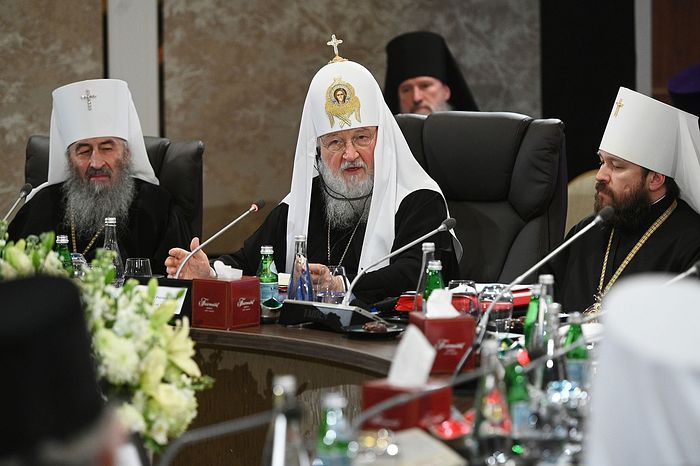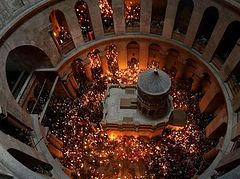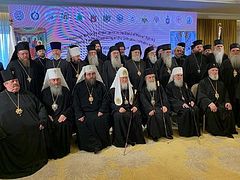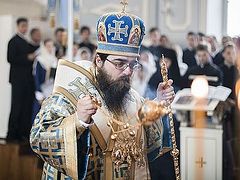Amman, Jordan, February 28, 2020
At the initiative of His Beatitude Patriarch Theophilos of Jerusalem, a fraternal gathering of hierarchs was held in Amman, Jordan, on Wednesday, February 26, with the participation of delegations from the Churches of Jerusalem, Moscow, Serbia, Romania, Poland, and the Czech Lands and Slovakia.
While Pat. Theophilos had invited all his brother primates, Patriarch Bartholomew and the primates of the Greek world—Alexandria, Cyprus, Greece, Albania—all refused to attend, arguing that only the Patriarch of Constantinople has the right to assemble the primates. The Church of Georgia also declined, saying the gathering would have little value without the participation of all the primates, while the Church of Antioch cited its contention with the Patriarchate of Jerusalem over Qatar and its desire not to contribute to any possible deepening of division, and the Church of Bulgaria declined for unnamed reasons.
The participating delegations issued a press release that focused on the need for unity and for serious issues in the Church to be resolved in a spirit of love and pan-Orthodox consensus, which the hierarchs of the various participating Churches had also focused on in their own presentations.
Pat. Theophilos opened the gathering, greeting all the hierarchs and emphasizing that, “Answers to all our questions must be found in dialogue and fraternal love.”
For his part, His Holiness Patriarch Kirill of Moscow thanked all the attending hierarchs for their participation, which took “a certain courage in some cases.”
In his view, the cause of the present crises in the Church is “the loss of a common understanding of the order of the Church and the nature of primacy in it,” which must be confronted and dealt with on the pan-Orthodox level.
As Patriarchia.ru reports, the Russian primate pinpointed what he views as the 6 most acute problems in the Church today:
“1. The problem of understanding primacy in the Church; attempts to justify the claims to universal leadership through specially created theological argumentation; the absence of a system of conciliar control over the actions of the primatial see, the need for consensus in decision-making on the pan-Orthodox scale.
2. The threat to the institute of autocephaly in the Church; the lack of a common Orthodox mechanism, indisputable for all, of granting autocephaly; attempts to introduce inequality among “senior” and “minor” autocephalous Churches.
3. Attempts to challenge the canonical boundaries of autocephalous Churches, to review and revoke the once adopted documents of historic importance defining these boundaries.
4. The claims of the first among equals in the family of Local Orthodox Churches to a right to receive appeals from any Church, the threats to use these appeals as an instrument of interference in the internal life of other Local Churches, which, I believe, demand comprehension and discussion.
5. The development of an abnormal situation in which the primatial hierarch, contrary to the basic principles of canon law, acts as a judge in a matter in which he is one of the sides and presents himself as the last instance in considering the matter, and
6. The problem of creating the so called ‘stavropegial structures’ in the territories of other Local Churches without their consent or against their will.’”
Pat. Kirill’s last point concerns the Patriarchate of Constantinople’s present attempts to establish a monastery-association in the Czech Republic without the consent of the Holy Synod of the Church of the Czech Lands and Slovakia.
His Holiness Patriarch Irinej of Serbia also emphasized the need to hold pan-Orthodox councils to fight for Church unity and the preservation of canonical principles.
His Eminence Metropolitan Nifon of Târgoviște, who led the delegation of the Romanian Orthodox Church, also spoke of the need for conciliar discussions and fidelity to the sacred canons, and suggested holding a conference prior to a possible future Synaxis of the Primates or pan-Orthodox council to thoroughly discuss the agenda, with hope that such a council would bring real unity in the Orthodox world.
His Eminence Archbishop Abel of Lublin and Chełm, who headed the delegation of the Polish Orthodox Church in place of the ailing Metropolitan Sawa of Warsaw, noted that the Polish Church is deeply concerned and is praying for a solution to the problem of Church unity. The present lack of unity inhibits the Church’s witness to the world, he said.
His Eminence Metropolitan Rastislav of the Church of the Czech Lands and Slovakia also emphasized the need to meet and discuss in order to find solutions that adhere to Sacred Scripture and proper Church order.
For his part, His Beatitude Metropolitan Onuphry of Kiev and All Ukraine spoke about the life of the canonical Ukrainian Church, noting that the development of ecclesiastical life there since 1990 has led to de facto autocephaly, as the Church has its own Holy Synod, its own Council of Bishops, and its own spiritual court.
The revered Ukrainian primate also told the participating hierarchs about the situation with the schism in Ukraine today, noting that the so-called process of unification only intensified the problem. He spoke in detail about the actions of the Patriarchate of Constantinople, noting that they seriously depart from the canonical norms of the Orthodox Church.
While many today believe that the schism would be healed were the Ukrainian Orthodox Church to become officially autocephalous, Met. Onuphry replied: “I want to be honest before God and my conscience and say that I am certain that the autocephalous status of the Ukrainian Orthodox Church will not heal the schism. Perhaps some schismatics would return to the fold of the canonical Church, but not all. Autocephaly does not guarantee absolute unity, and the autocephalous Churches that exist in the world have their own schisms.”
Our current problems can be solved “only when we give up our personal ambitions and act in the spirit of Divine humility and brotherly love,” His Beatitude emphasized.
The text of the resulting press release also emphasizes that the ecclesiastical situation in Northern Macedonia should be resolved within the framework of a dialogue within the Serbian Church with pan-Orthodox support, and calls on the leadership of Montenegro to respect and observe fundamental property rights, including those of the Serbian Orthodox Church.





